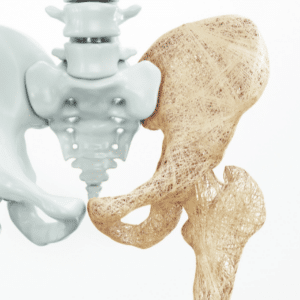Osteoporosis affects around 14 million people — that’s about 10% of the population. According to the International Osteoporosis Foundation, someone experiences an osteoporosis-related fracture every three seconds. Given the prevalence, we feel it’s important for you to be aware of its risk factors and how it’s treated. Here’s what New River Women’s Health wants you to know.

 What is Osteoporosis?
What is Osteoporosis?
Osteoporosis is a condition that causes bones to weaken and become more likely to break. Risk factors include being female, over the age of 50, and/or having a slender body type.
The majority of those with osteoporosis are women, though men sometimes develop it as well. Getting older increases our risk because as we age, we experience increased calcium loss and our decreased bone density. (This is especially true for post-menopausal women, who typically experience marked bone loss.)
Those with a slight build and/or low body weight are at a higher risk for osteoporosis because they have a lower bone density than those with a larger frame. Additionally, very slender people are more likely to fracture a bone when they fall because there is less “padding” protecting their bones.
A number of lifestyle factors, including smoking, being sedentary and drinking more than is healthy also contribute to bone loss and ultimately increase your chances of developing osteoporosis. You can help lessen the likelihood that you will develop osteoporosis by addressing any of the risk factors that are within you control, such as drinking less and/or stopping smoking.
Taking certain medications such as corticosteroids, anticonvulsants, and antacids increases your risk of developing osteoporosis. Many illnesses and diseases such as type 1 diabetes, hyperthyroidism, inflammatory bowel disease, and lymphoma can also increase the risk of developing the condition. A family history of adult-age fractures is also indicative of increased risk for osteoporosis.
If you have a health condition or use a medication that increases your chances of developing osteoporosis, ask your doctor about getting a bone density test so you can work together to assess your risk. Generally, bone density tests are recommended for:
- anyone who has experienced a fragility fracture
- women over the age of 65 and men over the age of 70
- women under 65 who are known to be at increased risk for developing osteoporosis
Additional measures to prevent osteoporosis include increasing your calcium and vitamin D intake (ask your doctor before taking supplements) and increasing activity levels. If you do end up developing osteoporosis, there are a number of treatment options available that will help combat it.
Our team at New River Women’s Health provides expert care in the areas of gynecology, obstetrics, gynecological surgery. We are here for every stage of your life and health. Request an appointment online or contact us today at 540-605-7566